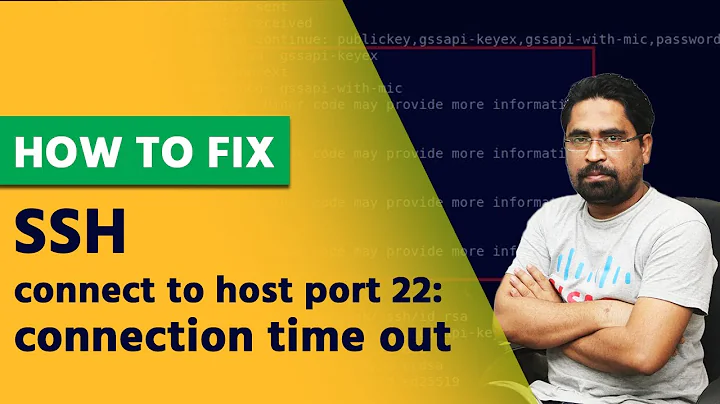SSH: DH_GEX group out of range
Solution 1
If you want to use newer OpenSSH to connect to deprecated servers:
ssh -o KexAlgorithms=diffie-hellman-group14-sha1 -o HostKeyAlgorithms=+ssh-dss my.host.com
Add -v if you want to see what's happening, and -o HostKeyAlgorithms=ssh-dss if it still doesn't work:
ssh -v -o HostKeyAlgorithms=ssh-dss -o KexAlgorithms=diffie-hellman-group14-sha1 my.host.com
You can also, of course, edit /etc/ssh/ssh_config or ~/.ssh/ssh_config, and add:
Host my.host.com *.myinsecure.net 192.168.1.* 192.168.2.*
HostKeyAlgorithms ssh-dss
KexAlgorithms diffie-hellman-group1-sha1
https://forum.ctwug.za.net/t/fyi-openssh-to-access-rbs-openssh-7/6069 mentions the following fix on Mikrotik Routerboards:
/ip ssh set strong-crypto=yes
(Noting this here because this answer also comes up on web searches when looking for a similar error message.)
If you want to use it over Git without editing your ssh_config or updating the SSH server:
GIT_SSH="ssh -oHostKeyAlgorithms=+ssh-dss -oKexAlgorithms=diffie-hellman-group14-sha1" git clone ssh://user@host/path-to-repository
Solution 2
It seems you have hit this bug.
Cause
A change was made to the openssh package, dealing with Diffie-Hellman Group Exchange. Previously, keys of size 1024 - 8192 could be exchanged. The minimum was raised to 1536 for added security and to avoid the "logjam" vulnerability. However, if used with some 3rd party ssh implementations which only support 1024, failure will occur. Ideally, the 3rd party ssh configuration or code should be updated to use larger key sizes.
...
You can find 3 different resolutions in the link. In situations where you don't have admin power or there is too much bureaucracy to get deeper changes, getting rid of the problematic algorithm while waiting for a SHA-2 availability in the server seemed the best option to me. You can even perform it in a user-based fashion in your $HOME/.ssh/config file.
KexAlgorithms diffie-hellman-group-exchange-sha256,diffie-hellman-group14-sha1,diffie-hellman-group1-sha1
Related videos on Youtube
sbrown
Updated on September 18, 2022Comments
-
sbrown almost 2 years
We recently applied a vendor-supplied patch for OpenSSH. This patch disabled a few key exchange protocols in response to the recent Logjam attack. After applying this patch, we have a few vendors with which we have not been able to exchange files via sftp because the connection negotiation is failing (likely due to the deprecated key exchange algorithms).
I would just like to verify a couple of things we are seeing before talking to our vendors. Here is a sample SSH session with one of the problem vendors (line numbers added):
# ssh -vv [email protected] 01 OpenSSH_6.2p2, OpenSSL 0.9.8j-fips 07 Jan 2009 02 debug1: Reading configuration data /etc/ssh/ssh_config 03 debug1: /etc/ssh/ssh_config line 20: Applying options for * 04 debug2: ssh_connect: needpriv 0 05 debug1: Connecting to host.domain.com [1.2.3.4] port 22. 06 debug1: Connection established. 07 debug1: permanently_set_uid: 0/0 08 debug1: identity file /root/.ssh/id_rsa type -1 09 debug1: identity file /root/.ssh/id_rsa-cert type -1 10 debug1: identity file /root/.ssh/id_dsa type -1 11 debug1: identity file /root/.ssh/id_dsa-cert type -1 12 debug1: identity file /root/.ssh/id_ecdsa type -1 13 debug1: identity file /root/.ssh/id_ecdsa-cert type -1 14 debug1: Enabling compatibility mode for protocol 2.0 15 debug1: Local version string SSH-2.0-OpenSSH_6.2 16 debug1: Remote protocol version 2.0, remote software version GXSSSHD_Comments 17 debug1: no match: GXSSSHD_Comments 18 debug2: fd 3 setting O_NONBLOCK 19 debug1: SSH2_MSG_KEXINIT sent 20 debug1: SSH2_MSG_KEXINIT received 21 debug2: kex_parse_kexinit: ecdh-sha2-nistp256,ecdh-sha2-nistp384,ecdh-sha2-nistp521,diffie-hellman-group-exchange-sha256,diffie-hellman-group-exchange-sha1,diffie-hellman-group14-sha1,diffie-hellman-group1-sha1 22 debug2: kex_parse_kexinit: [email protected],[email protected],[email protected],[email protected],[email protected],[email protected],[email protected],ecdsa-sha2-nistp256,ecdsa-sha2-nistp384,ecdsa-sha2-nistp521,ssh-rsa,ssh-dss 23 debug2: kex_parse_kexinit: aes128-ctr,aes192-ctr,aes256-ctr,arcfour256,arcfour128,aes128-cbc,3des-cbc,blowfish-cbc,cast128-cbc,aes192-cbc,aes256-cbc,arcfour,[email protected] 24 debug2: kex_parse_kexinit: aes128-ctr,aes192-ctr,aes256-ctr,arcfour256,arcfour128,aes128-cbc,3des-cbc,blowfish-cbc,cast128-cbc,aes192-cbc,aes256-cbc,arcfour,[email protected] 25 debug2: kex_parse_kexinit: [email protected],[email protected],[email protected],[email protected],[email protected],[email protected],[email protected],[email protected],[email protected],hmac-md5,hmac-sha1,[email protected],[email protected],hmac-sha2-256,hmac-sha2-512,hmac-ripemd160,[email protected],hmac-sha1-96,hmac-md5-96 26 debug2: kex_parse_kexinit: [email protected],[email protected],[email protected],[email protected],[email protected],[email protected],[email protected],[email protected],[email protected],hmac-md5,hmac-sha1,[email protected],[email protected],hmac-sha2-256,hmac-sha2-512,hmac-ripemd160,[email protected],hmac-sha1-96,hmac-md5-96 27 debug2: kex_parse_kexinit: none,[email protected],zlib 28 debug2: kex_parse_kexinit: none,[email protected],zlib 29 debug2: kex_parse_kexinit: 30 debug2: kex_parse_kexinit: 31 debug2: kex_parse_kexinit: first_kex_follows 0 32 debug2: kex_parse_kexinit: reserved 0 33 debug2: kex_parse_kexinit: diffie-hellman-group1-sha1,diffie-hellman-group14-sha1,diffie-hellman-group-exchange-sha1,diffie-hellman-group-exchange-sha256 34 debug2: kex_parse_kexinit: ssh-dss,ssh-rsa 35 debug2: kex_parse_kexinit: aes128-cbc,3des-ctr,aes128-ctr,3des-cbc,blowfish-cbc,arcfour,arcfour128 36 debug2: kex_parse_kexinit: aes128-cbc,3des-ctr,aes128-ctr,3des-cbc,blowfish-cbc,arcfour,arcfour128 37 debug2: kex_parse_kexinit: hmac-md5,hmac-sha1,hmac-md5-96,hmac-sha1-96,hmac-sha256,[email protected] 38 debug2: kex_parse_kexinit: hmac-md5,hmac-sha1,hmac-md5-96,hmac-sha1-96,hmac-sha256,[email protected] 39 debug2: kex_parse_kexinit: none,zlib 40 debug2: kex_parse_kexinit: none,zlib 41 debug2: kex_parse_kexinit: 42 debug2: kex_parse_kexinit: 43 debug2: kex_parse_kexinit: first_kex_follows 0 44 debug2: kex_parse_kexinit: reserved 0 45 debug2: mac_setup: found hmac-md5 46 debug1: kex: server->client aes128-ctr hmac-md5 none 47 debug2: mac_setup: found hmac-md5 48 debug1: kex: client->server aes128-ctr hmac-md5 none 49 debug1: SSH2_MSG_KEX_DH_GEX_REQUEST(1536<3072<8192) sent 50 debug1: expecting SSH2_MSG_KEX_DH_GEX_GROUP 51 DH_GEX group out of range: 1536 !< 1024 !< 8192`So during the key exchange negotiation, the client and server exchange their lists of supported algorithms (lines 21 and 33). They agree to use the first match found in the two lists, in this case
diffie-hellman-group-exchange-sha1. As I understand it, this algorithm supports a range of bit lengths that the client and server then have to negotiate. Under normal circumstances, the client and server agree on a bit length and exchange keys making use of a DH prime from themodulifile, e.g./etc/ssh/moduli(I know this last statement is very "laymen's speak," but that is roughly the long and the short of it).In this case, what I think I am seeing is that the bit-length negotiation is failing. On line 49, the client (me) is saying "I support bit lengths between 1536 and 8192 and want to use 3072 bits." However, the server replies back and says "I only support 1024 bits." At which point the client gives up and says "I can't talk to you." Is this a reasonable description of what is happening here?
As I understand it, the problem is entirely on the server end at this point (assuming we don't negotiate a weaker algorithm like
diffie-hellman-group1-sha1). The server would have to be modified to support the larger bit lengths during the key exchange process.I'd like to make sure I am understanding this correctly before proceeding. Input is appreciated.
-
 Michael Hampton over 8 yearsYou're reading it right. What on earth is at the other end? That doesn't look like any common ssh server.
Michael Hampton over 8 yearsYou're reading it right. What on earth is at the other end? That doesn't look like any common ssh server. -
sbrown over 8 yearsNo idea what the server is. We are experiencing the same issue with two different vendors, both of whom are banks. Neither server identifies itself in the session (which isn't surprising).
-
 Michael Hampton over 8 yearsYou'd think that banks would be a bit more on top of security, but alas...
Michael Hampton over 8 yearsYou'd think that banks would be a bit more on top of security, but alas... -
 Castaglia over 8 yearsSearching for "GXSSSHD_Comments" turns up comments in various SFTP client forums, which in turn seem to suggest that your server is the GXS MFT application -- very enterprisy.
Castaglia over 8 yearsSearching for "GXSSSHD_Comments" turns up comments in various SFTP client forums, which in turn seem to suggest that your server is the GXS MFT application -- very enterprisy. -
 Kovalex almost 4 yearsI've got it on network management port of dated Sun Enterprise T2000. Thanks to answers below I managed to login in using: Ciphers aes128-cbc HostKeyAlgorithms ssh-rsa KexAlgorithms diffie-hellman-group1-sha1
Kovalex almost 4 yearsI've got it on network management port of dated Sun Enterprise T2000. Thanks to answers below I managed to login in using: Ciphers aes128-cbc HostKeyAlgorithms ssh-rsa KexAlgorithms diffie-hellman-group1-sha1
-
-
bao7uo over 7 yearsthis works for sftp also






